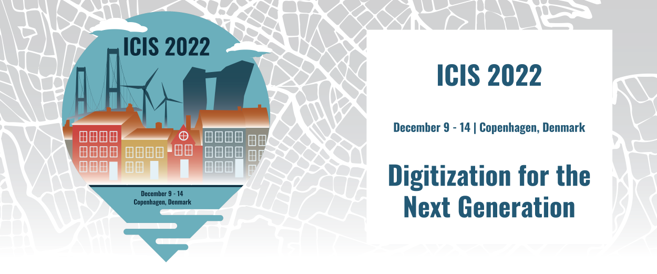Healthcare is an area of robust growth and importance in much, if not all, of the developed and developing world. The marriage of Healthcare and Information Systems (HIS) is one that promises many benefits, but also presents many challenges. This area of study has shown steady growth at local, regional, national, and international levels, and in areas that span the gamut of information systems topics. The promise of more efficient healthcare administration, safer provision of care, and the ability to extend the range of care through HIS has been examined in the information systems literature. In the past two years the importance of healthcare provision, healthcare practices, policies and the potential pitfalls of dis- and misinformation regarding healthcare has been a focus in both the trade and academic press, suggesting that HIS as a topical area of information systems research is likely to remain a focus for exploration. The promise of HIS is to deliver better, cost-efficient and patient-centric healthcare through widespread sharing of authorized data, process transformation and proactive involvement by patients to sustain their own well-being. There is early evidence that HIS, in isolation and in combination, impact care provision and administrative processes, enhance care quality, reduce healthcare costs and facilitate information sharing across organizational boundaries. However, researchers have not found consistent results and the context of examination is still central in understanding research findings. Additionally, national and regional governments worldwide have introduced several initiatives around technology use, data integration, privacy, payment models and access to care, and the commercial sector has launched several innovations in the consumer sector, which make it easier to track and consolidate individual-level data. Increasing standardization in the healthcare industry and the widespread use of HIS among health care providers, payers and consumers have enabled the creation of large datasets, which lend themselves well to predictive modeling. Track Co-Chairs; Miria Grisot, Ph.D., University of Oslo, Norway Seung Hyun Kim, Yonsei University, Korea Tracy Ann Sykes, Ph.D, University of Arkansas
Subscribe to RSS Feed (Opens in New Window)
| 2022 | ||
| Monday, December 12th | ||
| 12:00 AM |
A paradox theory perspective on HIT’s impact on continuity of care Adrian Yeow, Singapore University of Social Sciences 12:00 AM |
|
|---|---|---|
| 12:00 AM |
Thure Weimann, Technische Universität Dresden 12:00 AM |
|
| 12:00 AM |
Designing a Healthcare QA Assistant: A Knowledge Based Approach Prakash Chandra Sukhwal, Institute of Systems Science 12:00 AM |
|
| 12:00 AM |
Designing for Self-Management of Multiple Chronic Conditions by the Aging-at-home Sandeep Purao, Information and Process Management 12:00 AM |
|
| 12:00 AM |
Doctors’ Dilemma – Understanding the Perspective of Medical Experts on AI Explanations Aycan Aslan, University of Goettingen 12:00 AM |
|
| 12:00 AM |
Joseph Manga, University of Texas Rio Grande Valley 12:00 AM |
|
| 12:00 AM |
Nico Pietrantoni, Technische Universität Dresden 12:00 AM |
|
| 12:00 AM |
Healthy reviews!- Online physician ratings reduce healthcare interruptions Michael Kummer, University of East Anglia 12:00 AM |
|
| 12:00 AM |
Hiding Behind Your Tweets: An Empirical Investigation of Offline Responses in a Crisis Kailing Deng, The University of Tulsa 12:00 AM |
|
| 12:00 AM |
Hospital App Affordances for Patient Engagement: An Examination of Motifs Inkyoung Hur, Florida Atlantic University 12:00 AM |
|
| 12:00 AM |
In-Training Multicalibrated Survival Analysis For Healthcare via Constrained Optimization Thiti Suttaket, National University of Singapore 12:00 AM |
|
| 12:00 AM |
Janine Rottmann, University of Würzburg 12:00 AM |
|
| 12:00 AM |
Mobile Stress Management Applications: An Affordance-Theoretic Perspective on the Adoption and Use Katharina Pflügner, University of Bamberg 12:00 AM |
|
| 12:00 AM |
No Longer Without a Reward: Do Digital Rewards Crowd Out Intrinsic Motivation of Young Children? Joanna Graichen, University of Bamberg 12:00 AM |
|
| 12:00 AM |
Patient Acceptance of Blockchain for Management of Health Information Sophia Mannina, Queen's University 12:00 AM |
|
| 12:00 AM |
Simulation-Based Electronic Health Record Usability Evaluation: A Proof of Concept Ankita Srivastava, Bentley University 12:00 AM |
|
| 12:00 AM |
The Economics of Online Subsidiary Healthcare Systems Zhe Wang, Tsinghua University 12:00 AM |
|
| 12:00 AM |
The Impact of Remote Patient Monitoring on Chronic-Disease Readmissions: The Role of Disparities William Olivera, Georgia State University 12:00 AM |
|
| 12:00 AM |
Towards a Theory-Based Evaluation of Explainable Predictions in Healthcare Suparna Ghanvatkar, National University of Singapore 12:00 AM |
|
| 12:00 AM |
Towards effective collective IS use in a voluntary healthcare environment (Paper-a-thon) Jennifer Jewer, Memorial University of Newfoundland 12:00 AM |
|
| 12:00 AM |
Understanding Patient Journeys with Telehealth: A Poisson-Factor-Marked Hawkes Process Quan Zhang, Michigan State University 12:00 AM |
|
| 12:00 AM |
Understanding Remote Patient Monitoring as an Infrastructure Framework Jennifer Claggett, Wake Forest University 12:00 AM |
|


